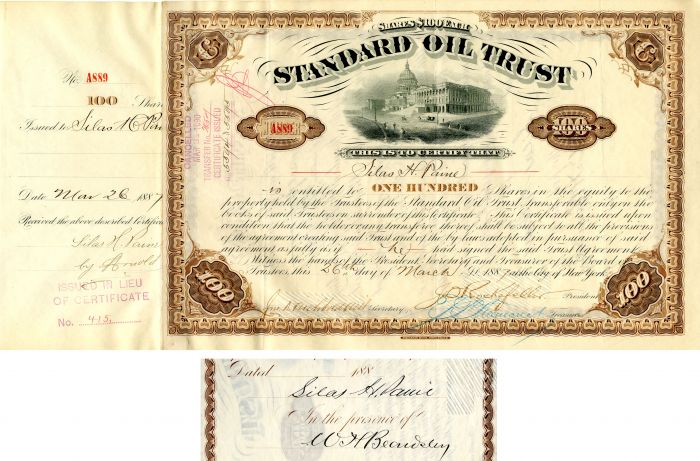Standard Oil Trust signed by Silas H. Paine - Stock Certificate
Inv# AG2278 Stock
Ohio
Stock issued to and signed by Silas H. Paine. Also signed by J.D. Archbold, W.H. Beardsley, and J.D. Rockefellar.
Silas H. Paine, Vice-President of Standard Oil Trust. In the introduction to Stories of the Great Hymns of the Church, Luther D. Wishard describes Silas H. Paine as follows: "A busy official of a corporation of world-wide note, he took time throughout a period of forty years to assemble a large and rare collection of hymn books and also to compile a mass of incidents concerning hymns, their authorship, the causes which gave them birth, and their influence upon lives." An executive at a lubricating plant in the Rockefeller Group, Paine is also remembered for having donated his Silver Bay, NY, property to the YMCA to serve as a conference center for the training and educating of young people in foreign missions.

John Dustin Archbold (1848-1916) Capitalist. Speculator in Pennsylvania oil fields, 1866. When the South Improvement Co., whose membership included John D. Rockefeller, blocked the advance of Pennsylvania oil producers by obtaining railroad freight rebates, Archbold united the leading men of the Titusville region and defeated this strong Cleveland group. He then joined the Cleveland combination in working out a national organization to control the oil industry. John Dustin Archbold was a key executive in the growth and success of the Standard Oil Company. He became a Director of Standard Oil of Ohio Company in 1875 and by 1897 was functionally in charge of the company. As president (1896-1911) of Standard Oil Company of New Jersey (founded 1882) he was largely instrumental in building up that corporation’s business. From 1882 until his death he was dominant in Standard Oil Company policy, acted as spokesman for the company, and improved the product and it’s distribution. Over 30 years (1893-1914) he contributed funds (nearly $6,000,000) for 8 buildings at Syracuse University, including the full cost of the Archbold stadium (opened 1907, demolished 1972), Sims Hall (men's dormitory, 1907), the Archbold gymnasium (1909, nearly destroyed by fire in 1947 but still in use), and the oval athletic field. A bequest from his estate gave an additional $500,000 to the university. Among his other charities was the New York Kindergarten Association, for which he built its headquarters building, in memory of his deceased daughter, Frances Dana Wolcott, and for which he also provided an endowment fund of $100,000. His grandson, Richard Archbold, founded the Archbold Biological Station in 1941 In 1911, at the dissolution of the original company, he became president of Standard Oil of New Jersey.

John Davison Rockefeller (1839-1937) Founder and one of the original partners of Standard Oil; Oil industry pioneer; Capitalist. At one time reputedly the world's richest man, Rockefeller began his career in Cleveland, Ohio as a successful merchant, prior to the Civil War. In 1863, he and his partners built a refinery which grew into a business that eventually absorbed many other Cleveland refineries and expanded into Pennsylvania oil fields to become the world's largest refining concern. During this time, he was able to expand his operations while others were failing due the talented people with whom he had surrounded himself, to the efficiency of his operations, and to a variety of what are now considered unscrupulous business practices for which he became famous. In 1870, Rockefeller organized the Standard Oil Company of Ohio in order to improve the efficiency with which his operations were being run. In 1882, in part to streamline operations, and in part to avoid state controls, Rockefeller took a step which had a profound significance for American business by creating the Standard Oil Trust. Under this arrangement, a board of trustees took the stock of both the Standard Oil Company of Ohio and of all of its subsidiaries, and ran the combination through the board's executive committee. By this time, public criticism of Rockefeller and his methods was running at near-fever pitch and, in 1892, the Trust was dissolved by the Ohio Supreme Court. The Trust was divided into some 18-later over 30-corporations before being folded into another holding company, Standard Oil of New Jersey (1899). In 1911, the U.S. Supreme Court ordered this latter company dissolved, declaring that it was "a monopoly in restraint of trade," and thus illegal under the Sherman Anti-Trust Act. By this time Rockefeller had almost completely removed himself from business concerns, and was concentrating solely on his philanthropic projects. While the extent of his philanthropies are too numerous to list, among the most prominent are his founding of the University of Chicago (1889), the Rockefeller Institute for Medical Research (1901), the General Education Board (1902) and the Rockefeller Foundation (1913). It is estimated that Rockefeller gave away some $550 million during his lifetime.

W.H. Beardsley, President of the Florida East Coast Railway. He became president of the Florida East Coast Railway following Flagler and trustee of the Flagler estate. Further research necessary.
A stock certificate is issued by businesses, usually companies. A stock is part of the permanent finance of a business. Normally, they are never repaid, and the investor can recover his/her money only by selling to another investor. Most stocks, or also called shares, earn dividends, at the business's discretion, depending on how well it has traded. A stockholder or shareholder is a part-owner of the business that issued the stock certificates.









Ebay ID: labarre_galleries